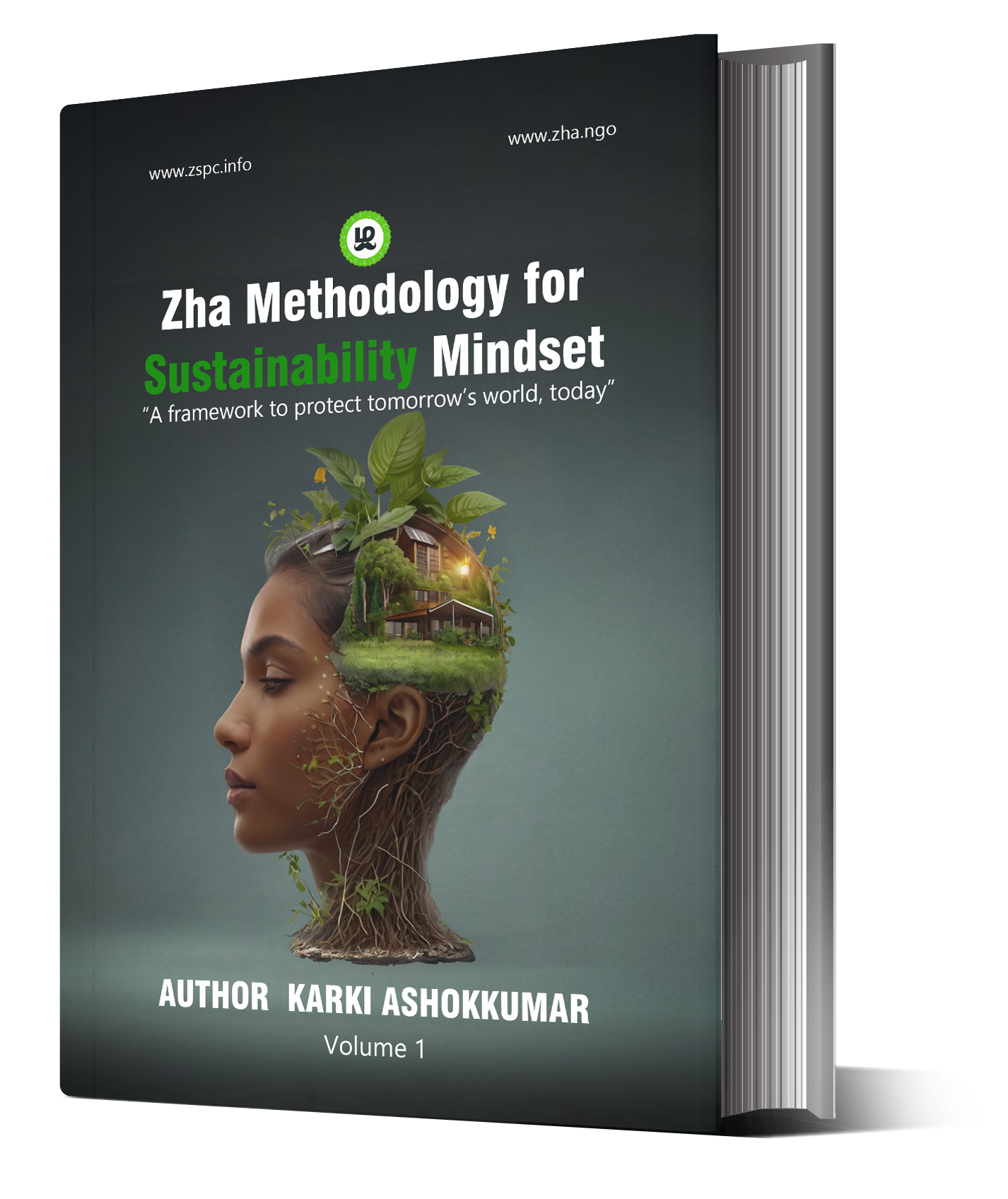Zha Founder’s Note

Dear ZHA Members of the Sustainability Practitioners Club,
Greetings!
Thank you to all of you who support our nonprofit initiatives, embracing this global cause as a passion for wellness and sustainability.
The introduction of ZSPC membership fees serves to ensure a committed engagement with the noble cause of shaping responsible citizens through ZSPC’s sustainability club activities, including student involvement and community-building workshops.
My father, Mr. N. Ashokkumar (Educationist, Farm Products Entrepreneur & Social Worker), born in Peravurani, Thanjavur District, Tamil Nadu, India, has dedicated much of his life and resources to social work aimed at improving the lives of people in his community, guiding them toward a sustainable future. Unfortunately, progress has been slow due to a lack of awareness and alignment with sustainability mindset principles and policies. Despite this, my father has invested several crores of his own savings and earnings in building a sustainable community. Recognizing the absence of a structured framework in his efforts, I, as his son and a technology transformation consultant by profession, developed the ZHA framework for cultivating a sustainability mindset. This framework enables individuals to actively contribute as members of the ZSPC, helping improve their quality of thought through structured sustainability principles.
I am also deeply inspired by my school, Mahatma School in Madurai, where the correspondent, Mrs. Premalatha Paneerselvam, nurtured in us, since 1990, a sense of social responsibility. She took us on initiatives aimed at improving the lives of village students and fostering community development through cleanliness drives, social education, nature conservation, and more. Her guidance instilled in me the values of Mahatma’s ethical way of life, which shaped my sustainability mindset. This mindset drives me to make conscious, responsible decisions that do not compromise sustainable practices. This inspiration led me to design ZSPC club activities so that students and professionals can integrate them into their lives as a hobby, dedicating 2–4 hours a week to these important practices.
The logic is simple: If one person can contribute to the development of people in a single community, why shouldn’t other successful individuals support research, workshops, and conferences that promote the sustainability mindset as part of our nation-building efforts? This sustainable social work starts with students and is supported by professionals who share this vision.
The ultimate vision of Zha Foundation, through its nonprofit initiatives, is to cultivate individual maturity in the sustainability mindset. Together, we can make the planet a better place, standing united to create a safe and sustainable Earth for future generations of responsible citizens, animals, all living beings, and plants.
அன்பான ழ வல்லுநர்கள், மாணவர்கள் சங்க உறுப்பினர்களுக்கு,
வணக்கங்கள்!
உலக நலனையும், நிலைத்தன்மையையும் கடமைக்கொண்டு எங்கள் நிதி இல்லா முயற்சிகளுக்கு ஆதரவு அளிக்கும் அனைவருக்கும் நன்றி.
ZSPC உறுப்பினருக்கான கட்டணத்தை அறிமுகப்படுத்தியதன் நோக்கம், மாணவர்கள் பங்கேற்பும் சமூகக் கட்டமைப்பு பணிகளும் உட்பட, ZSPC நிலைத்தன்மைச் சங்க நடவடிக்கைகளின் மூலம் பொறுப்பான குடிமக்களை உருவாக்கும் உயரிய நோக்கத்திற்கு உறுதியாக ஈடுபாட்டை உறுதி செய்வதே.
என் தந்தை, திரு. என். அசோக்குமார் (கல்வியாளர், விவசாய பொருட்கள் தொழிலதிபர் மற்றும் சமூகச் செயல்வீரர்), தமிழ்நாட்டின் தஞ்சாவூர் மாவட்டத்தில் உள்ள பேராவூராணியில் பிறந்து, அந்தப் பகுதிக்கான நல்ல நாளையும் நிலைத்தமான வாழ்க்கையையும் நோக்கி மக்கள் பயணிக்க, அவர்களது வாழ்க்கையை மேம்படுத்துவதற்காக சமூகப்பணியில் தனது பெரும் வாழ்க்கையும் வளங்களையும் அர்ப்பணித்துள்ளார். நிலைத்தன்மை மனப்பான்மை முறைகள் மற்றும் கொள்கைகளின் பற்றாக்குறையால், தொடர்ந்து நிலைத்த மனப்பான்மையை வளர்ப்பதில் முன்னேற்றம் மந்தமாக உள்ளது. இருப்பினும், என் தந்தை தனது சுயப் பொக்கிஷமும் வருமானமும் பல கோடிகளைப் பயன்படுத்தி நிலைத்த சமுதாயத்தை உருவாக்க பாடுபட்டார். அவரது சமூகப்பணி முயற்சிகளில் அமைவில்லா கட்டமைப்பு இருந்ததை உணர்ந்து, அவரின் மகனாகவும் தொழில்முறை தொழில்நுட்ப மாற்ற ஆலோசகராகவும், நான் ழ நிலைத்த மனப்பான்மையை வளர்க்கும் கட்டமைப்பை உருவாக்கினேன். இந்தக் கட்டமைப்பு ZSPC உறுப்பினர்களாகச் சேர்ந்து செயல்படுவதற்கு அனுமதி அளிக்கின்றது, மேலும் அமைப்பான நிலைத்த மனப்பான்மை நெறிகளின் வழியாக மனிதர்களின் சிந்தனைத் தரத்தை மேம்படுத்த உதவுகிறது.
மதுரை மகாத்மா பள்ளியின் தலைமை ஆசிரியர் திருமதி. பிரேமலதா பன்னீர்செல்வம் அவர்கள் 1990ஆம் ஆண்டு தொடங்கி நமக்கு சமூகப் பொறுப்புணர்வை வளர்த்தமை எனக்கு மிகப் பெரிய ஆச்சரியம். கிராம மாணவர்களின் வாழ்க்கையை மேம்படுத்தவும், சுத்தம், சமூகக் கல்வி, இயற்கை பாதுகாப்பு போன்ற சமூக வளர்ச்சிப் பணிகளில் பங்கேற்கச் செய்தனர். மகாத்மாவின் வாழ்க்கை நெறிகளைக் கொண்டு வாழ்கிற மகாத்மா பள்ளியின் வழிமுறைகள் எனக்கு நிலைத்த மனப்பான்மையை வளர்த்ததோடு, நீண்டகால உளவியல் குறிக்கோள்கள் உள்ளடக்கமான முடிவுகளை எடுக்க எனக்கு உறுதியாக உதவியது. இதன் மூலம் ZSPC சங்க நடவடிக்கைகளை நான் வடிவமைத்தேன், மாணவர்களும் தொழில்முறையாளர்களும் தங்கள் வாழ்க்கையில் ஒரு பொழுதுபோக்காக 2-4 மணி நேரம் பயன்படுத்திக்கொள்ள முடியும் வகையில் அதை நடைமுறைக்கு கொண்டு வர முடியும்.
நமது சிந்தனை எளிமையானது: ஒரு தனிநபர் ஒரு இடத்தில் மக்களின் வளர்ச்சிக்கு பங்களிக்க முடிந்தால், ஏனோ பிற வெற்றிகரமான நபர்கள் ஆராய்ச்சி, பட்டிமன்றங்கள், கருத்தரங்குகளை ஆதரிக்கக்கூடாது? இது மாணவர்களிடமிருந்து தொடங்குகிறது, மற்றும் இதை பகிர்ந்து கொள்வதற்கு தொழில்முறையாளர்கள் ஆதரவு தருகிறார்கள்.
நமது ழ அறக்கட்டளை நிறுவனங்களின் இறுதி நோக்கம், நிலைத்த மனப்பான்மையை வளர்ப்பது மூலம் மனிதர்களின் பொறுப்புணர்வை மேம்படுத்துவது. இணைந்து, நாம் எங்கள் கிரகத்தை ஒரு சிறந்த இடமாக மாற்ற முடியும்—பொறுப்புணர்வுள்ள எதிர்கால குடிமக்கள், விலங்குகள், அனைத்து உயிரினங்களும், செடிகள் மற்றும் சுற்றுச்சூழல் பாதுகாப்புக்காக.

Our Vision
To create measurable carbon footprint savings through the ZSPC curriculum, offering certifications for schools and badges for solving sustainability challenges in colleges.
Our Club Methodology - ZHA Framework For Sustainability Mindset
The ZHA sustainability mindset methodology focuses on instilling a holistic approach to sustainability among students. It emphasizes understanding the interconnectedness of environmental, social, and economic systems and the importance of long-term thinking and action. This methodology involves experiential learning, where students engage in real-world projects and activities that promote sustainable practices through our ZHA Framework for Sustainability Mindset.


